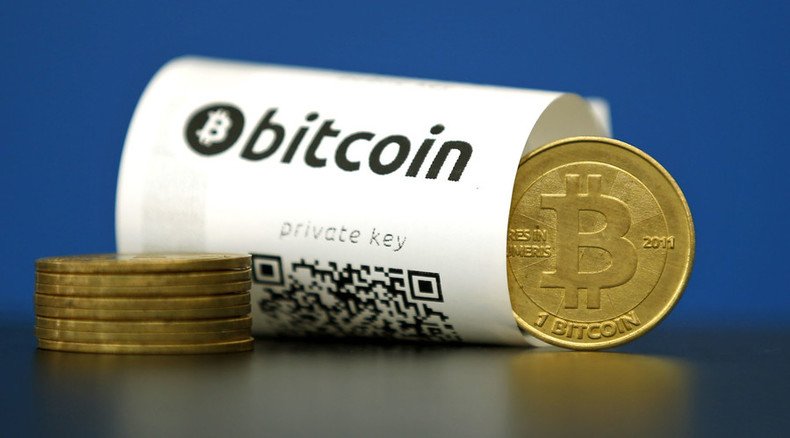Bitcoin will be 6th biggest reserve currency by 2030 – study

Bitcoin will become the world’s sixth largest reserve currency by 2030, according to an investment agency. The rising popularity of the virtual currency will also see banks invest around $1 billion in blockchain technology.
The claims were made by UK-based Magister Advisors, which helps to advise the technology industry on mergers and acquisitions. They came to the conclusions after interviewing a number of Bitcoin companies from around the world and there was a general view it would become a key reserve currency in the space of just 15 years.
"Blockchain is without question the most significant advancement in enterprise IT in a decade, on a par with big data and machine learning. What JAVA is to the Internet, blockchain is to financial services. We have now reached a fork in the road with Bitcoin and blockchain. Bitcoin has proven itself as an established currency. Blockchain, more fundamentally, will become the default global standard distributed ledger for financial transactions,” said Jeremy Millar, a partner at Magister Advisors, in a statement released by the organization.
France’s biggest bank BNP Paribas tests #bitcoins - media http://t.co/3GH1riDb19pic.twitter.com/SxlKtMedKK
— RT (@RT_com) July 24, 2015A blockchain is a network of computers, all of which must approve a transaction has taken place before it is recorded, in a chain of computer code. As with Bitcoins, the first application of the technology, applied to money, cryptography is used to keep transactions secure and costs are shared among those in the network.
Given the importance of developing blockchain technology, the survey by the group found that banks and financial institutions are willing to spend around $1 billion on projects over the next two years.
The blockchain technology will not replace key infrastructure in place, such as wire transfers, but instead it will complement it by helping to store metadata.
"Banks will initially be unwilling to remove the core infrastructure that handles the process of clearance and settlement but they will increasingly run parallel blockchain processes, evidence by the spike in investment that our poll has identified,” Millar added in the statement cited by the IB Times.
$5mn worth of #bitcoin missing in major cryptocurrency exchange hack http://t.co/cGg19hIeE6pic.twitter.com/wbhSVQmFcd
— RT (@RT_com) January 6, 2015He also added that he expects the technology to become increasingly popular.
"Blockchain technology will underpin a growing number of routine transactions globally as trust grows. Our interviews with 30 of the leading Bitcoin companies worldwide cement our view that the currency is gaining traction. Growing vendor acceptance and the adoption of Bitcoin in developing markets are creating a pincer movement that will lead to widespread business and consumer acceptance and adoption over time,” he said.
Bitcoins are also experiencing a boom in value. On Wednesday November 4, the price increased by a massive 12.5 percent. It opened trading at $400.71, but in the space of just a few hours, had risen to $450.60, the Coindesk website reports.
Microsoft now accepting #bitcoin for games, apps http://t.co/17Pv4X0PwRpic.twitter.com/tyI4KlQrVx
— RT (@RT_com) December 13, 2014In September, nine of the world’s largest investment banks, including JP Morgan and Goldman Sachs, partnered with New York-based tech startup R3CEV. The firms are looking to develop common standards using the same technology behind Bitcoin.
The blockchain technology R3CEV is working on underpins the internet-based bitcoin currency. The controversial cryptocurrency doesn’t have a central authority – its security comes from the network of all Bitcoin users who share the same protocols, which together act as a distributed ledger to keep track of every transaction. Not having a central authority means that an internet-wide catastrophe would have to occur in order to compromise the integrity of the ledger.
'Should be treated as money' Aussi govt seeks #bitcoin recognition as regular currency http://t.co/BSpDre4LWLpic.twitter.com/D8ue0oQ7a7
— RT (@RT_com) August 4, 2015The banks collaborating to make use of the blockchain technology in mainstream finance are JP Morgan, Commonwealth Bank of Australia, BBVA, Barclays, Goldman Sachs, UBS, Royal Bank of Scotland, Credit Suisse and State Street. They see it as a way of instantly updating payment ledgers and transferring money without relying on the trust of a central authority.
“If you’re looking to introduce applications with distributed ledger technologies to improve the financial markets, you can’t have each participant working to a different pattern,” Christopher Murphy, global co-head of FX, rates and credit at UBS told The Financial Times. “What R3 ... [is] doing is bringing a consensus which could establish common standards.”
LISTEN MORE:












